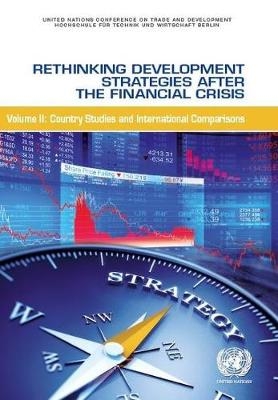
Rethinking development strategies after the financial crisis
Vol. 2: Country studies and international comparisons
Seiten
2016
United Nations (Verlag)
978-92-1-112895-6 (ISBN)
United Nations (Verlag)
978-92-1-112895-6 (ISBN)
The recent economic trends and the challenges posed by the global crisis reinforce the importance of implementing strategies for development as opposed to leaving the economy to market forces. Countries need a strategic compass for long-run economic development, either explicitly or implicitly. Among other ingredients, this comprises macroeconomic policies, sectoral policies (including the financial sector, trade and industrial policies), institution building in key areas and development-friendly global governance. Within a chosen medium- or even long-term strategy, governments need more policy space to adjust to the specific (and evolving) social, historical and institutional context. The experience of Asia shows that rather than implementing narrow and rigid general guidelines, experimental approaches - which require policy space - are a recipe for success. Furthermore, the slow-growth periods endured by several countries (the "lost decades") allowed inferring which policies should be avoided. The authors of this publication share the notion that developing countries can and should learn more from each other, as well as from their own past experience. It is important to look at comparisons between developing countries, including both success and failure stories. In this second volume, seven country studies contribute to this approach. From this perspective, poor economic results in developing regions and transition economies in the 1980s and 1990s have to be compared with rapid output growth and social improvements in the two preceding decades, as well as the 2000s. Several factors have contributed to explaining these contrasts. In particular, the existence of a developmental State that uses its room for manoeuvre to act on both the supply and demand side is a common denominator of most successful experiences. On the contrary, neoliberal policies that restrained the role of the State in the economy and dismissed the need to preserve any policy space prevailed in the slow-growing regions during the lost decades.
| Erscheinungsdatum | 26.06.2016 |
|---|---|
| Reihe/Serie | Rethinking development strategies after the financial crisis |
| Verlagsort | New York |
| Sprache | englisch |
| Themenwelt | Wirtschaft ► Volkswirtschaftslehre ► Finanzwissenschaft |
| Wirtschaft ► Volkswirtschaftslehre ► Makroökonomie | |
| ISBN-10 | 92-1-112895-1 / 9211128951 |
| ISBN-13 | 978-92-1-112895-6 / 9789211128956 |
| Zustand | Neuware |
| Haben Sie eine Frage zum Produkt? |
Mehr entdecken
aus dem Bereich
aus dem Bereich
eine Einführung in die Staatsfinanzen
Buch | Hardcover (2024)
Vahlen (Verlag)
39,80 €
New Foundations
Buch | Softcover (2022)
Edward Elgar Publishing Ltd (Verlag)
64,75 €
and why it doesn't work the way we think it does
Buch | Softcover (2023)
Pan Books (Verlag)
13,70 €


